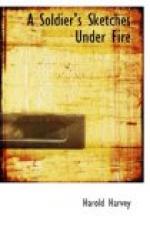A FRENCH COMEDIAN.
Later on, and farther on—after our capture of a position I shall shortly have occasion to describe—we made the acquaintance of a French “born comedian,” who was a tower of strength at our entertainments, and who in various other ways was a cause of constant amusement. He had been left behind by his regiment, and we found him hanging around the place. It had been his home, and it seemed that the magnet of life-long associations held him to it. He was very useful in taking us round to cottages which, to our surprise, we found to be still inhabited, and in giving us the tip where to find cheap, if very thin, beer and other refreshments. He was particularly proud of his German jack-boots—made for legs very much bigger than his own. When we had concerts he used to give us clever imitations of the late Harry Fragson in his “Margarita” and other varieties, to the accompaniment of the mouth-organ band. He used to say: “Ze Engleesh soldier—tres bon—ze French soldier—bon—mais ze Allemand—no bon!” On one occasion he told us: “Apres la guerre, ze Engleesh soldier beaucoup admirers—ladees! Ze French soldier admirers, too. Ze Allemand—non!”
[Illustration: A French comrade-comedian.]
He got hold of peasants to wash our clothes for us and introduced us to a little mill-race, which we reached through a thicket which concealed us, and the spectacle of our men stripping and diving into the stream in cold weather amused him hugely. He jumped about in his big boots, exclaiming: “Vat your vife say if she see you in ze water? Vat she say if she see you ici?” The English replied, in the best French at their command, “beaucoup lave—tres bon,” at which our comical comrade-at-arms laughed more heartily than ever. When his regiment found out where he was a guard was sent up, and he was obliged to remain in charge of it, to his great regret, when we moved on. He wished us “bonne chance,” assuring us that it was his one desire after the war to get to Angleterre, where he had never been; but now that he knew the English he must visit us to make our further acquaintance. So much for our comical French friend, ever so amusing and ever so polite.




